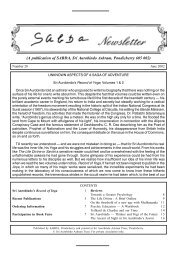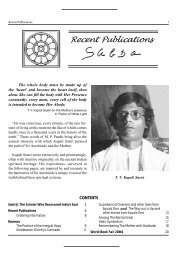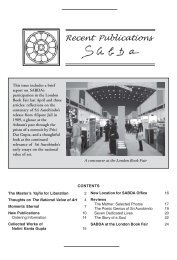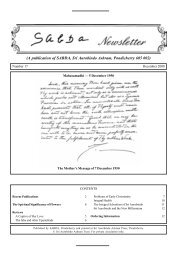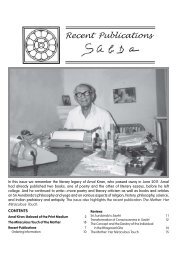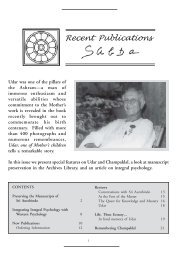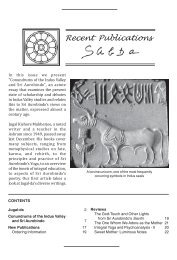November 2010 - Sabda - Sri Aurobindo Ashram
November 2010 - Sabda - Sri Aurobindo Ashram
November 2010 - Sabda - Sri Aurobindo Ashram
You also want an ePaper? Increase the reach of your titles
YUMPU automatically turns print PDFs into web optimized ePapers that Google loves.
elationship with his wife, he is not really thinking<br />
of leaving her. In fact, he is deeply worried about her<br />
future when he sees that he cannot even contemplate<br />
a new life with the singer without thinking of what<br />
would happen to his wife.<br />
This leaves us with the final difficulty—that of<br />
interpreting the complex denouement at the end of<br />
the play, which in the view of the playwright is<br />
actually a happy ending, the problem presented at<br />
the beginning being resolved. Those who could not<br />
see that there was a problem at all could not see that<br />
the end brought a solution. The theme of the whole<br />
play was a bit too avant-garde for its time. After the<br />
performance, the French government officials, who<br />
were customarily invited to the annual programmes<br />
of the 1 st and 2 nd December, left without coming to<br />
thank the Mother as they usually did. It was clear<br />
that even they had been quite shocked by the story.<br />
The fact that the wife was leaving the husband was<br />
something that the people in the audience, Indian<br />
as well as French, found hard to accept. Many of<br />
those who had watched the play thought it was about<br />
infidelity and a wife abandoning her marital duties.<br />
During the preparation of our performance in 1995<br />
I got the impression that when the play had first<br />
been performed in 1949 it had left the viewers a bit<br />
uneasy. From what I gathered as I spoke to a number<br />
of people, it was a piece of writing which, being a<br />
work of fiction, was not given much importance by<br />
most. I also came to understand that it was the whole<br />
question of a man-woman relationship, its difficulties<br />
and its undertones of unhappiness, that had left<br />
everyone quite baffled and unsure of how to relate to<br />
it, and so the work was not taken up again for a<br />
performance on stage for all those years.<br />
For many people who watched that performance it<br />
was difficult to grasp what exactly made the couple<br />
part ways so easily. They felt that the play was<br />
somehow justifying the way the poet is attracted to<br />
another woman even though he was married and<br />
the way he desires to be united to this woman about<br />
whom he knows so little and that too within minutes<br />
after having met her. The point that most people<br />
did not catch was that the husband and the wife<br />
were already dissatisfied with their lives but had not<br />
admitted this to each other.<br />
Perhaps the reason why this play was nearly forgotten<br />
was because there were many points that were not<br />
very obvious to the viewers. For example, it was<br />
unclear for many in the audience why the wife was<br />
leaving her husband. They wondered why she was<br />
not happy with him. After all, she wasn’t in a violent<br />
or abusive relationship. The poet has great respect<br />
for her, and in one scene in the play where the couple<br />
is together and alone, they seem to have a perfectly<br />
normal conversation. At no point during that scene<br />
do they seem unhappy together. It was difficult for<br />
people to understand that they both wanted<br />
something else, something more. It was also very<br />
intriguing for people to see the stand the wife takes<br />
in front of her husband’s sudden attraction for<br />
another woman. Why was she not hurt or angry?<br />
For 1949 the play offered too many unanswered<br />
questions.<br />
There was clearly a gap between the playwright and<br />
her audience. The Mother surely took it for granted<br />
that everyone would understand that the couple in<br />
question was looking for a deep fulfilling<br />
companionship where the two could be united at all<br />
levels of their being. The wife says at the very<br />
beginning of the play that her life is empty. She<br />
points out to her schoolfriend that she and her<br />
husband are good friends and adds, “Esteem and<br />
mutual concessions create a harmony that makes life<br />
quite bearable; but is that happiness?” On his side<br />
the husband says, when he is alone, “I admire her, I<br />
feel a deep respect for her... But all that is not love...<br />
Love! What a dream! Will it ever become a reality?”<br />
The Mother had obviously set her story in the Parisian<br />
artists’ milieu of the late 19 th century in which she<br />
had lived and in which the concept of romantic love,<br />
or something more than that, was accepted and<br />
understood and where social conventions did not<br />
have the last word. But it was hard for the audience<br />
in Pondicherry to understand why anybody would<br />
want anything more than living without<br />
disagreements under one roof. In the Indian context<br />
of the times a loving companionship, even romantic<br />
love, was not essential to a harmonious married life.<br />
Marriage was more about duties than personal<br />
fulfilment.<br />
4



